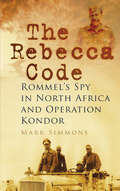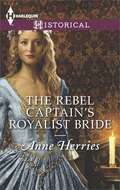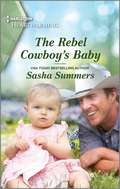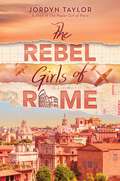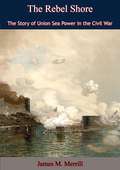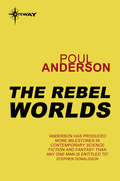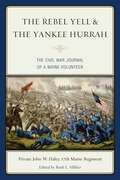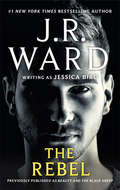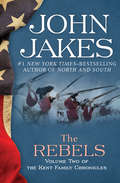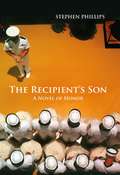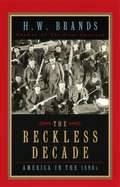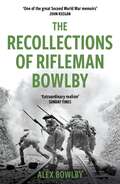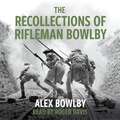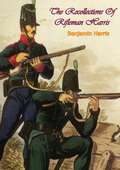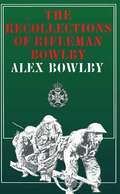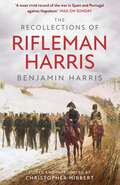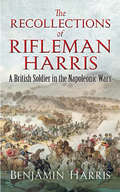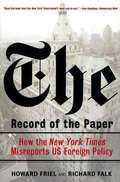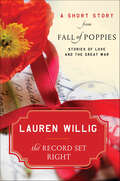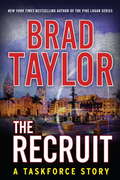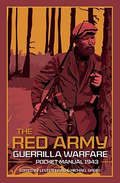- Table View
- List View
The Rebecca Code: Rommel's Spy in Africa and Operation Condor
by Mark SimmonsJohn Eppler thought himself to be the perfect spy. Born to German parents, he grew up in Egypt, adopted by a wealthy family and was educated in Europe. Fluent in German, English and Arabic, he made the Hadj to Mecca but was more at home in high society or travelling the desert on camelback with his adopted Bedouin tribe. After joining the German Secret Service in 1937, in 1942 he was sent across the desert to Cairo by Field Marshal Rommel. His guide was the explorer and Hungarian aristocrat Laszlo Almasy, a man made famous by the book The English Patient. Eppler’s mission was to infiltrate British Army Headquarters and discover the Eighth Army’s troop movements and battle plans. In The Rebecca Code, Mark Simmons reveals the story of Operation Condor and its comedy of errors and how it was foiled by Major A.W. ‘Sammy’ Sansom of the British Field Security Service. It is a tale of the desert, of the hotbed of intrigue that was 1940s Cairo, and the spy who was to send his reports using a code based on Daphne du Maurier’s novel Rebecca.
The Rebel Captain's Royalist Bride
by Anne HerriesLOVE THINE ENEMY... Orphaned and without protection, Babette Harvey must suffer in silence when her uncle gives shelter to a band of Rebels-though her Royalist blood boils! But other dangerous passions must also be quieted-including those aroused by the handsome and commanding Rebel leader Captain James Colby. When Babette's talent for herbal medicine attracts suspicions of witchcraft, she has nowhere to turn save to Colby-her honorable enemy. And with the captain determined to claim her as his bride, Babette must choose which to betray-her principles or her heart. "Another enjoyable romp." -RT Book Reviews on An Innocent Debutante in Hanover Square
The Rebel Cowboy's Baby: A Clean Romance (The Cowboys of Garrison, Texas #1)
by Sasha SummersCan a wild cowboy prove…He's daddy material? Rodeo cowboy Audy Briscoe loves getting into trouble. If he can't charm his way into beautiful and straitlaced Brooke Young's heart, then he'll settle for rilin' her up but good! When a terrible tragedy leaves them co-guardians of a baby girl, Audy finds himself in over his head. Is it too late to turn this restless rebel cowboy into the kind of man—and father—Brooke could love?The Cowboys of Garrison, TexasBook 1: The Rebel Cowboy's BabyBook 2: The Wrong CowboyBook 3: To Trust a Cowboy
The Rebel Girls of Rome
by Jordyn TaylorPart historical mystery, part sweeping romance, The Rebel Girls of Rome brings the stories of two young women to brilliant life: Lilah, a college student looking to understand her grandfather’s mysterious past, and Bruna, a queer Jewish woman who joins the resistance during World War II. From Jordyn Taylor, author of The Paper Girl of Paris, this dual-contemporary and historical tale—where heartbreak, hope, and finding light in times of darkness are inevitably intertwined—is perfect for readers of Ruta Sepetys and Monica Hesse. Now:Grieving the loss of her mother, college student Lilah is hoping to reconnect with a grandfather who refuses to talk about his past. Then she receives a mysterious letter from a fellow student, Tommaso, claiming he’s found a lost family heirloom, and her world is upended. Soon Lilah finds herself in Rome, trying to unlock her grandfather’s history as a Holocaust survivor once and for all. But as she and Tommaso get closer to the truth—and their relationship begins to deepen into something sweeter—Lilah realizes that some secrets may be too painful to unbury… Then:It’s 1943, and nineteen-year-old Bruna and her family are doing their best to survive in Rome’s Jewish quarter under Nazi occupation. Until the dreaded knock comes early one morning, and Bruna is irrevocably separated from the rest of her family.Overcome with guilt at escaping her family’s fate in the camps, she joins the underground rebellion. When her missions bring her back to her childhood crush, Elsa, Bruna must decide how much she’s willing to risk—when fully embracing herself is her greatest act of resistance.
The Rebel Shore: The Story of Union Sea Power in the Civil War
by James M. MerrillFirst published in 1957, this book details the important part that the sea power played in winning the Civil War.“IN the past few decades there has been a resurgence of interest in the Civil War reflected in an avalanche of Civil War novels, biographies, and monographs. The writers responsible for this torrent have for the most part focused attention on the battlefields, the halls of Congress, the economics of war, and the actors, big and small. The role of sea power has been minimized. The best work on Civil War naval operations is still Boynton’s two-volume work published in 1867. No author to date has sifted the countless number of official naval dispatches or unearthed personal correspondence of Yankee bluejackets and attempted to evaluate the importance of Lincoln’s forces afloat. The reason is not difficult to find. The Civil War generation—a generation weaned on the marching armies of the Mexican War and the American West—read column after column in its newspapers and listened to politicians in and out of Congress raving about the military achievements or defeats. Misunderstood by the Lincoln Administration, the war correspondents, and the public at large, the operations of the Union sea arm were given scant publicity.“Union amphibious attacks spearheaded the offensive. They were, perhaps, more significant than the blockade itself. Old Abe’s Armada carried the flag first into the South, secured needed bases for the blockading squadrons, wiped out Confederate coastal commerce, scotched privateering activities, precipitated the ruckus between the secessionist states and the Confederate Government, and, throughout the first year of the conflict, while the Union Army licked its wounds after Bull Run, buoyed up a sagging Northern spirit and strengthened the belief that the Union could crush the rebellion.”
The Rebel Worlds: A Flandry Book
by Poul AndersonThe barbarians in their long ships waiting at the edge of the Galaxy waited for the ancient Terran Empire to fall, while two struggled to save it: ex-Admiral McCormac, forced to rebel against a corrupt Emperor, and Starship Commander Flandry, the brilliant young officer who served the Imperium even as he scorned it.Trapped between them was the woman they both loved, but couldn't share: the beautiful Kathryn - whose single word could decide the fate of a billion suns.
The Rebel Yell & the Yankee Hurrah: The Civil War Journal of a Maine Volunteer
by John W. HaleyOn an "I will if you will" dare, John Haley enlisted in the 17th Maine Regiment in August 1862 "for three years, unless sooner discharged." ("Discharged, shot, or starved" would have been more accurate, Haley later wryly observed.) Though a reluctant soldier at first, he served steadfastly in the Army of the Potomac for nearly three years, participating in some of the most significant battles of the Civil War.John Haley was not the only soldier to record each day's events in his journal by firelight or by picket's lantern, for his was a literate generation. He was unusual in that he later painstakingly rewrote his battlefield notes, "reflecting at leisure" and adding fascinating political and personal commentary to produce the remarkable volume he calls Haley's Chronicles.
The Rebel: The Rebel The Player The Renegade The Rogue (The\moorehouse Legacy Ser.)
by J. R. WardOnly one woman can tame him…. Experience the first book in the Moorehouse Legacy series from New York Times bestselling author J.R. Ward writing as Jessica Bird, first published as Beauty and the Black Sheep!Entrepreneur Nate Walker does whatever it takes to carve out his place in life. After rejecting his family’s legacy and losing a gold-digging fiancé in the process, it’s just him, his chef knives and his trusty old car on the road to developing a five-star restaurant… until the trusty old car breaks down in the Adirondacks, leading him right to White Caps Inn… and Frankie Moorehouse.Suddenly Nate has a job he doesn’t really need—and an affair that has to end when summer does. Except Frankie has a way about her. She gets under his skin. She even makes him want to do what he never thought he could: stay forever.Originally published in 2005
The Rebels (The Kent Family Chronicles #2)
by John JakesPhilip Kent fights for his new country during the Revolutionary War, in the historical family saga from the #1 New York Times–bestselling author. The engrossing follow-up to The Bastard finds Philip Kent standing as a Continental solider at the Battle of Bunker Hill. In a bold move, Kent has taken up arms for the future of his new family. Spirited and unwavering in his dedication to his adopted homeland, Kent fights in the most violent battles in America&’s early history. As the Revolution rages, Kent&’s story interweaves with the trials of a vivid cast of characters, both famous and unknown. The result is a tautly plotted epic novel that transports the reader into the thrilling adventure of a man&’s fight for a new life. This ebook features an illustrated biography of John Jakes including rare images from the author&’s personal collection.
The Rebirth of Italian Communism, 1943–44: Dissidents in German-Occupied Rome
by David BroderDuring the final years of the Second World War, a decisive change took place in the Italian left, as the Italian Communist Party (PCI) rose from clandestinity and recast itself as a mass, patriotic force committed to building a new democracy. This book explains how this new party came into being. Using Rome as its focus, it explains that the rebirth of the PCI required that it subdue other, dissident strands of communist thinking. During the nine-month German occupation of Rome in 1943-44, dissident communists would create the capital’s largest single resistance formation, the Communist Movement of Italy (MCd’I), which galvanised a social revolt in the capital's borgate slums. Exploring this wartime battle to define the rebirth of Italian communism, the author examines the ways in which a militant minority of communists rooted their activity in the everyday lives of the population under occupation. In particular, this study focuses on the role of draft resistance and the revolt against labour conscription in driving recruitment to partisan bands, and how communist militants sought to mould these recruits through an active effort of political education. Studying the political writing of these dissidents, their autodidact Marxism and the social conditions in which it emerged, this book also sheds light on an often-ignored underground culture in the years that preceded the armed resistance that began in September 1943. Revealing an almost unknown history of dissident communism in Italy, outside of more recognisable traditions like Trotskyism or Bordigism, this book provides an innovative perspective on Italian history. It will be of interest to those researching the broad topics of political and social history, but more specifically, resistance in the Second World War and the post-war European left.
The Recipient's Son
by Stephen PhillipsThe names solemnly displayed in Memorial Hall at the U.S. Naval Academy serve as a constant reminder of why Annapolis is different from Harvard, or Stanford, or Duke. No midshipman recognizes this more viscerally than Donald Durago, who knows all too well that some will die--heroically, tragically, slowly, or quickly--in the service of their country.Set at the U.S. Naval Academy in the 1990s, The Recipient's Son tells the story of a young man's struggle to come to terms with his legacy as the son of a war hero and with his doubts about his own courage. Durago's father was killed in the Vietnam War where his actions as a POW earned him the Medal of Honor. That honor provided Durago with an appointment to the Naval Academy, a benefit offered to all children of Medal of Honor recipients.During his plebe year, Durago struggles under the burden of being worthy of his father's memory. With the help of Master Chief Strong, he begins to identify with his father's sacrifice, his own naval heritage, and Academy life. When an incident during his senior year brings his character into question triggering terrifying nightmares Durago realizes he has not completely dealt with his father's death. Before he can graduate, he must defend himself at a board of inquiry and faces "separation," a fate worse than mere expulsion. However, with the support of his roommate and a pretty JAG officer he finds the confidence to pursue a military career. The Recipient's Son is a stirring tale of a young man coming to grips with the heroism of his father and overcoming his self-doubts to accept the challenge of serving his country on his own terms.
The Reckless Decade: America in the 1890s
by H. W. BrandsA famous historian demonstrates that one can learn a lot about the contradictions that lie at the heart of America today by looking at them through the lens of the 1890s.
The Recollections Of Rifleman Bowlby (W&N Military)
by Alex Bowlby'One of the great Second World War memoirs ... will be read as long as that war is remembered' John Keegan'Extraordinary realism' SUNDAY TIMES'A touch of the Somme and more than a hint of Wilfred Owen' TLSA classic of WWII, this is the vivid memoir of Private Bowlby, who came through the North Africa campaign only to have to battle in bitter fighting against a stubborn and skilled German defence in Italy. It is a truly authentic account of what it was like to fight your way through one of the most gruelling and dangerous campaigns of the Second World War, where so often the hunters became the hunted.A superb first-hand account of the the second world war.
The Recollections Of Rifleman Bowlby (W&N Military)
by Alex Bowlby'One of the great Second World War memoirs ... will be read as long as that war is remembered' John Keegan'Extraordinary realism' SUNDAY TIMES'A touch of the Somme and more than a hint of Wilfred Owen' TLSA classic of WWII, this is the vivid memoir of Private Bowlby, who came through the North Africa campaign only to have to battle in bitter fighting against a stubborn and skilled German defence in Italy. It is a truly authentic account of what it was like to fight your way through one of the most gruelling and dangerous campaigns of the Second World War, where so often the hunters became the hunted.A superb first-hand account of the the second world war.
The Recollections Of Rifleman Bowlby (W&N Military)
by Alex Bowlby'One of the great Second World War memoirs ... will be read as long as that war is remembered' John Keegan'Extraordinary realism' SUNDAY TIMES'A touch of the Somme and more than a hint of Wilfred Owen' TLSA classic of WWII, this is the vivid memoir of Private Bowlby, who came through the North Africa campaign only to have to battle in bitter fighting against a stubborn and skilled German defence in Italy. It is a truly authentic account of what it was like to fight your way through one of the most gruelling and dangerous campaigns of the Second World War, where so often the hunters became the hunted.A superb first-hand account of the the second world war.
The Recollections Of Rifleman Harris
by Pickle Partners Publishing Captain Henry Curling Benjamin Randell HarrisThis ebook is purpose built and is proof-read and re-type set from the original to provide an outstanding experience of reflowing text for an ebook reader. In an era devoid of modern communication methods, letters and diaries from the literate officer classes of the Napoleonic wars abound ,in all of the languages of the combatant nations. Much less often heard is the voice of the enlisted man, particularly in the British armed forces, an invaluable insight is provided by the recollections of Rifleman Harris late of the 95th Rifles. The often brutal realities of the era were collated by an officer whom he knew, Captain Curling, and published in 1848, and although not well known at the time has become one of the most famous recorded by any rank. One of Harris' first memoires of his time in the army is the devastating spectacle of a firing squad for a court-martial of one of the rank and file and of the court-martial of the bungling General Whitelock whose mishandled expedition to Buenos Ayres. The man from the rank and file was shot, but General Whitelock was merely cashiered, a difference of class and the times unintentionally brought to light. Whitelock's court-martial provides the first appearance of General (at the time Colonel) Craufurd, who went on the expedition with Whitelock and want to have his former commander shot for his ineptitude!, and under whom Harris would spend a great deal of his soldiering career. Harris takes a small part in another expedition to Denmark, but the only sort of action he is involved in is defending a Danish family from the depredations of fellow soldiers. It is however with his entrance into Portugal in 1808, that his adventures really begin to take shape; as his fellow soldiers fall around him at the battles of Roliça and Vimiero he describes the horrific injuries sustained, the plundering of the dead that took place (which he was not above joining in) and the task of the surgeons to try and stitch up the wounded. A large part of the narrative is taken by the retreat of Sir John Moore's army to Coruña, and the Light Brigade's to Vigo. His tales of the retreat are vividly described; from the capture of the French general Lefebvre-Desnouettes at Benavente, the privation, the wifes of the soldiers and their struggle to stay with the column, to the iron resolve of General Craufurd to keep going. Eventually and in a pitiable state Harris reaches Vigo and embarks for England. It was not enemy action that ended Harris' career in the army but diseases contracted during the pestilent 1809 Walcheren campaign, the lingering sickness forced Harris to leave the army and take up trade as a cobbler. A valuable and excellent read. Text taken, whole and complete, from the 1848 edition, published in London by H Hurst. Original - 298 pages. Author- Benjamin Harris (1781-????) Editor - Captain Henry Curling (????-????) Linked TOC.
The Recollections of Rifleman Bowlby (Cassell Military Paperbacks Ser.)
by Alex BowlbyThe classic memoir by an infantryman in the British army during the Second World War, &“a book to bring a shiver to the most grizzled veteran (The Sunday Times). In 1944, having distinguished itself in the North Africa campaign, Rifleman Bowlby&’s battalion of Greenjackets was sent to Italy. But instead of being used in the specialized role for which it had been trained, most of the battalion&’s vehicles were taken away on arrival, and the riflemen were told that they were to be used as ordinary infantry. Stripped of its hard core of regulars, the battalion suffered one disastrous defeat after another until its hard-won reputation fell in tatters. This is a memoir that captures &“quite extraordinary realism in this worm&’s eye view . . . the sweating, slogging, frightened infantryman in conditions of extreme stress and horror&” (The Sunday Times).
The Recollections of Rifleman Harris (MILITARY MEMOIRS)
by Benjamin Randell Harris'Describing narrow squeaks and terrible deprivations, Harris's unflowery account of fortitude and resilience in Spain still bristles with a freshness and an invigorating spikiness' SCOTLAND ON SUNDAY'A most vivid record of the war in Spain and Portugal against Napoleon' MAIL ON SUNDAYBenjamin Harris was a young shepherd from Dorset who joined the army in 1802 and later joined the dashing 95th Rifles. His battalion was ordered to Portugal, where he marched under the burning sun, weighed down by his kit and great-coat, plus all the tools and leather he had to carry as the battalion's cobbler - 'the lapstone I took the liberty of flinging to the Devil'. Rifleman Harris was a natural story-teller with a remarkable tale to unfold, and his Recollections have become one of the most popular military books of all time.
The Recollections of Rifleman Harris (MILITARY MEMOIRS)
by Benjamin Randell Harris'Describing narrow squeaks and terrible deprivations, Harris's unflowery account of fortitude and resilience in Spain still bristles with a freshness and an invigorating spikiness' SCOTLAND ON SUNDAY'A most vivid record of the war in Spain and Portugal against Napoleon' MAIL ON SUNDAYBenjamin Harris was a young shepherd from Dorset who joined the army in 1802 and later joined the dashing 95th Rifles. His battalion was ordered to Portugal, where he marched under the burning sun, weighed down by his kit and great-coat, plus all the tools and leather he had to carry as the battalion's cobbler - 'the lapstone I took the liberty of flinging to the Devil'. Rifleman Harris was a natural story-teller with a remarkable tale to unfold, and his Recollections have become one of the most popular military books of all time.
The Recollections of Rifleman Harris: A British Soldier in the Napoleonic Wars (Dover Military History, Weapons, Armor)
by Benjamin HarrisDiaries, memoirs, and letters by officers of the Napoleonic era abound, but there are few reminiscences by common foot soldiers. This extraordinarily vivid and entirely authentic report by British rifleman Benjamin Harris offers rare glimpses of life among the enlisted men. Harris's personal anecdotes, brimming with ready wit and memorable descriptions, tell of military life from the bottom up: the soldiers' camaraderie amid physical hardships and inadequate supplies and equipment, their endemic drunkenness and frequent hunger, the terrible punishments meted out for even small infractions, and the narrow margin between death and survival.In the mid-1830s, Harris was working as a London cobbler when he met a former British Army officer who asked him to recount his wartime experiences. A natural storyteller with a remarkable tale to tell, Harris recalled his years of active service, which began in 1803 when he joined the 95th Regiment of Foot in Ireland and were followed by campaigns from 1808 to 1809 in Portugal and Spain. First published in 1848, this memoir was neither popular nor well received during Harris's lifetime, but since its rediscovery in the early twentieth century, it has become one of the most valuable documents of the Peninsular War.
The Record Of The Paper: How The New York Times Misreports U.S. Foreign Policy
by Howard Friel Richard FalkOn May 26, 2004, the New York Times issued an apology for its coverage of Iraq's purported weapons of mass destruction. The Times had failed to provide what most readers expect from the US newspaper of record: journalistic accuracy and integrity about important matters of US foreign policy. But the Times' coverage of Iraq was worse than they were willing to concede. In fact, for at least the past fifty years the editorial policy of the Times--from its coverage of the 1954 Geneva Accords on Vietnam to the issue of torture in Abu Ghraib--has failed to incorporate international law into its coverage of US foreign policy. This lapse, as the authors demonstrate, has profound implications for the quality of the Times' journalism and the function of the press in a country supposedly governed by the rule of law. In this meticulously researched study, Howard Friel and Richard Falk reveal how the Times has consistently misreported major US foreign policy issues, including the bombing of North Vietnam in response to the Tonkin Gulf and Pleiku incidents in 1964-65, the Reagan administration's policy toward the Sandinista government of Nicaragua in the 1980s, the 2002 military coup that briefly overthrew Hugo Chavez, Venezuela's elected president, and the Bush administration's 2003 invasion of Iraq.
The Record Set Right: A Short Story from Fall of Poppies
by Lauren WilligIn a short story from New York Times bestselling author Lauren Willig, a woman discovers it’s never too late to make things rightShe's the widow of the Aviator in the Iron Mask-- a British World War I hero whose exploits both on the field and off of it made the papers on two continents. But was their Armistice Day engagement really the romantic fantasy it seemed? A lifetime later, Camilla Frobisher is forced to retrace the steps of her past-- all the way back to November 11, 1918, the day her life changed forever.
The Recruit
by Brad TaylorRetired Delta Force officer Brad Taylor's exciting new short story features Taskforce operators Knuckles and Decoy, as the two stumble upon an audacious plot when they least expect it. Includes an exclusive preview of Brad Taylor's eighth Pike Logan thriller, The Insider Threat, coming June 30, 2015. When Taskforce operator Knuckles brings his old friend Decoy, a former teammate from the Navy SEALs, to Lima, Peru, he wonders if he's made a mistake. Knuckles' only objective is to assess Decoy's covert surveillance skills on an orientation deployment, the final step before any recruit is accepted into the extralegal counterterrorist organization known as the Taskforce. Just when Decoy's wild side threatens to expose their cover as technicians working for the embassy--and derail his chances of becoming a full member of the Taskforce--the two uncover an unexpected piece of intelligence involving the terrorist group, the Shining Path, that causes their mission to go from evaluation to operational. With no backup and a flimsy cover story, Knuckles and Decoy find themselves in murky territory, relying on the help of an untried asset to prevent a devastating attack on countless innocents.
The Recruit: A Taskforce Story, Featuring an Excerpt from The Forgotten Soldier
by Brad TaylorRetired Delta Force officer Brad Taylor's exciting new short story features Taskforce operators Knuckles and Decoy, as the two stumble upon an audacious plot when they least expect it. Includes an excerpt of Brad Taylor's latest Pike Logan novel, The Forgotten Soldier, on sale 12/29/2015. When Taskforce operator Knuckles brings his old friend Decoy, a former teammate from the Navy SEALs, to Lima, Peru, he wonders if he's made a mistake. Knuckles' only objective is to assess Decoy's covert surveillance skills on an orientation deployment, the final step before any recruit is accepted into the extralegal counterterrorist organization known as the Taskforce. Just when Decoy's wild side threatens to expose their cover as technicians working for the embassy--and derail his chances of becoming a full member of the Taskforce--the two uncover an unexpected piece of intelligence involving the terrorist group, the Shining Path, that causes their mission to go from evaluation to operational. With no backup and a flimsy cover story, Knuckles and Decoy find themselves in murky territory, relying on the help of an untried asset to prevent a devastating attack on countless innocents.
The Red Army Guerrilla Warfare Pocket Manual, 1943 (The Pocket Manual Series)
by Lester GrauThe indispensable guerilla warfare manual, first developed by the Russian military during WWII—with a thorough introduction on its legendary history. During the Second World War, the Red Army developed The Partisan's Companion to train Soviet guerillas to fight Nazi invaders It contains the Soviet lessons of two bitter years of war, covering field craft, guerilla tactics, German counter-guerrilla tactics, demolitions, German and Soviet weapons, scouting, camouflage, anti-tank warfare and anti-aircraft defense for squad and platoon-level instruction. It proved so effective that it was later used to train Third World guerrillas in their wars of national liberation during the 1950s–70s, and even the Fedayeen guerrillas who fought US and coalition forces in Iraq. The Soviet partisans moved and lived clandestinely, harassed the enemy, and supported the Red Army through reconnaissance and attacks on German supply lines. They clearly frustrated German logistics and forced the Germans to periodically sideline divisions for rear-area security. The partisans and their handbook were a vital part of the eventual Soviet victory over Germany. This pocket manual puts The Partisan's Companion in context, explaining its importance.
